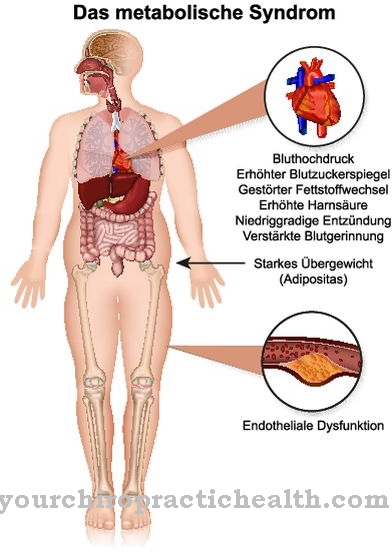A Thymoma is a rare tumor of the mediastinum that originates from the thymus and is in most cases benign. Men and women are equally often affected by a thymoma. The tumor is usually easy to treat, with a thymoma usually being removed surgically as part of a resection.
What is a thymoma?

© VectorMine - stock.adobe.com
As Thymoma is a rare tumor disease of the thymus, which in most cases (around 75 percent) can be classified as benign. The thymus is located near the heart, in the anterior region of the mediastinum, and as the primary organ of the lymphatic system is important for the development and differentiation of certain T lymphocytes in childhood.
The symptoms characteristic of a thymoma such as cough, feeling of pressure, dysphagia (difficulty swallowing), functional disorders of the heart, hoarseness or shortness of breath usually only manifest themselves in the later stage of the disease, when the size of the thymoma constricts and damages neighboring structures, especially the esophagus and trachea.
causes
The causes of a malignant (malignant) Thymoma or thymic carcinomas could not yet be clarified. What is certain is that the tumor arises from a degenerate cell that multiplies and damages the surrounding structures through its growth.
In addition to genetic factors, certain environmental factors such as pollutants and toxins as well as radiation are discussed as triggers for this degeneration process. In contrast, benign thymomas are often associated with certain diseases. In around 20 to 40 percent of cases, myasthenia gravis (autoimmune disease) occurs together with a thymoma, although the exact relationship between these diseases has not been clarified.
It is assumed that the dysregulated antibodies that attack the body's own muscle cells in myasthenia gravis could come from the thymus. In addition, anemia (pur red cell aplasia), hypogammaglobulinaemia (lack of antibodies), polymyositis (inflammation of the skeletal muscles), thyroiditis (inflammation of the thyroid gland) and Sjogren's syndrome (autoimmune disease) are associated with a benign thymoma.
Symptoms, ailments & signs
Affected people usually only report symptoms to a doctor when the disease has progressed.It is symptomatic that the tumor displaces another tissue or grows into it. At first, signs are sometimes misinterpreted. Conventional drugs then remain ineffective and promise no cure. Depending on the location of the thymoma, different symptoms arise.
If the tumor presses on the esophagus, patients complain of difficulty swallowing. If shortness of breath occurs, the windpipe is usually narrowed. A persistent cough can then also be encountered. In both cases, those affected regularly report pressure in the chest area. If, on the other hand, persistent hoarseness is noticeable, then there is usually paralysis of the cervical nerves. If the tumor attacks the heart, there is a risk of life-threatening dysfunction.
The characteristic effects are accompanied by general phenomena resulting from the weakening of the organism. Basically, sick people tire unusually quickly without having exhausted themselves physically beforehand. The body is susceptible to illnesses, which disrupts everyday life and requires compliance with hygienic standards. The weight is often reduced within a few months. The muscle strength decreases. Long walks can be a pain. Sudden dizziness threatens everywhere.
Diagnosis & course
Diagnosing one Thymoma takes place on the basis of the characteristic symptoms as part of an anamnesis and physical examination. The diagnosis is confirmed by imaging procedures such as an X-ray examination, an MRT (magnetic resonance tomography) or CT (computer tomography).
Imaging methods can also be used to make statements about localization, size, stage and impairment of the surrounding tissue structures. A biopsy with subsequent histological (tissue) analysis, which serves to differentiate between malignant and benign thymoma, is usually only carried out as part of a surgical tumor resection (removal of the tumor), since the thymus is inconvenient and difficult to access.
As a rule, the course and prognosis of both benign and malignant thymomas are good, depending on the time of diagnosis and stage of the tumor disease, and around 90 percent of those affected are still alive five years after diagnosis.
Complications
Tumors of the thymus are benign in about three quarters of all cases. With prompt treatment, no complications are usually to be expected. However, a recurrence cannot be ruled out. Because thymomas are slow-growing tumors, it can take up to ten years for the tumor to return after treatment that appears successful. Patients therefore have to undergo regular preventive examinations over long periods of time.
If the tumor is not treated in time, the typical symptoms such as shortness of breath, chest pain and heart problems often take on very severe forms and considerably impair the patient's quality of life. If the tumor is discovered too late, it is not uncommon for its size to be reduced with chemotherapy before surgery can be performed.
Chemotherapy is often associated with a number of very unpleasant side effects, in particular nausea, vomiting and loss of scalp hair. Irradiation can damage the heart or lungs in individual cases. Furthermore, complications can arise if the tumor grows into surrounding organs or metastases form.
The latter is particularly dangerous with the rather rare malignant thymomas. In these cases, chemotherapy or radiation therapy is almost always required. Deaths are rare but cannot be completely ruled out.
When should you go to the doctor?
A doctor should be consulted if there is a steady increase in malaise, a feeling of illness or an inner tiredness. If there is a decrease in physical strength, a loss of mental performance and a lower level of resilience, it is advisable to clarify the cause. General dysfunctions, general weakness, an increased need for sleep and irregularities in the heart rhythm should be examined and treated. Headaches, hoarseness, restrictions on breathing or swallowing are signs of a health disorder.
If the muscular strength decreases, the everyday obligations can no longer be fulfilled or if the person concerned experiences a restriction in the performance of the usual sporting activities, action is required. Palpitations, dizziness, restricted mobility and fatigue are further signs of an existing illness. If the person concerned suffers from changes in the complexion, hoarseness or increasing psychological problems and behavioral problems, a doctor should be consulted.
If the joy of life decreases continuously over a longer period of time, if there is a withdrawal from social and societal life or if the person affected suffers from rapid irritability, the observations should be discussed with a doctor. In many cases, emotional and mental problems indicate the presence of a physical impairment. Extensive examinations are necessary to determine the cause of the symptoms.
Treatment & Therapy
The therapeutic measures depend on you Thymoma on the stage of the disease. If there is a small thymoma that is limited to the thymus, the tumor with the surrounding conspicuous lymph nodes and the adjacent connective and fatty tissue are surgically removed (resection).
In the more advanced stages of a thymoma, radiation therapy measures are also used to avoid recurrence (recurrence of the tumor). In some cases, such as metastasis (9 percent of cases) or a very poor general condition of the person concerned, chemotherapeutic measures are also used.
Even with large thymomas, the tumor can first be reduced in size using chemotherapy before it is surgically removed. In some cases, combination therapy with a somatostatin analog (synthesized growth hormone), which interferes with tumor development and delays its growth, and cortisone is indicated for patients in whom resection is excluded and chemotherapy and / or radiation therapy measures have not been successful .
However, this therapeutic approach is still being researched in the context of clinical tests. Regular follow-up and check-ups with the help of imaging procedures as well as blood tests for the early detection and treatment of recurrences are essential components of successful thymoma therapy, as thymomas have a high local recurrence rate.
You can find your medication here
➔ Medicines against coughs and coldsprevention
As the causes of a Thymoma are not clarified, there are no preventive measures to date. People affected by diseases with which a thymoma is associated (especially myasthenia gravis) should be checked for an underlying thymoma at an early stage.
Aftercare
Thymomas can be both benign and malignant. For this reason, regular follow-up after the actual treatment is extremely important. It should also be noted that the local recurrence rate of thymomas is high. New manifestations of the tumor can still appear ten years after surgical removal, which makes long-term monitoring necessary. Non-Hodgkin's lymphoma, which not infrequently shows up after a thymoma, is one of the most common secondary tumors or secondary carcinomas.
Follow-up care for the thymoma after cancer treatment has been completed includes check-ups that take place at regular intervals. The doctor carries out imaging tests. Blood tests will also be done. In this way, possible recurrences can be diagnosed at an early stage and treated accordingly.
During the follow-up period, the patient seeks a check-up every three months for the first two years. As part of this, the doctor looks at the patient's medical history and performs a thorough physical examination. Computed tomography (CT) of the thorax (chest) is also recommended every 12 months.
In this way, local recurrences can be effectively discovered with these methods. It is advisable to have the follow-up examinations carried out by the thoracic surgeon who was previously responsible for treating the tumor. In the case of proven myasthenia, examinations should also be carried out by a neurologist.
You can do that yourself
For patients with a thymoma, medical treatment and care come first. Self-help measures can support medical interventions, but should not be the only means. Adequate medical therapy is of the utmost importance in the presence of a thymoma, since the disease is in some cases of a malignant nature and thus poses a threat to the life of those affected.
It is therefore in the interest of patients with thymoma to undergo all the check-ups offered by various specialists and to actively participate in the treatment of the disease. For example, prescribed drugs must be taken exactly as prescribed and any side effects reported to the doctor immediately.
In some cases, removal of the thymoma and sometimes the entire thyroid gland is required. This is especially necessary when it is a malignant tumor in an advanced stage. Patients prepare for this operation in the best possible way by taking care of themselves physically and mentally, avoiding stress, following a healthy diet and avoiding stimulants such as cigarettes and alcohol.
Even after the operation, they pay attention to physical restraint and undergo all control and follow-up examinations with the doctor so that any complications can be treated in good time.

.jpg)




.jpg)

















.jpg)



